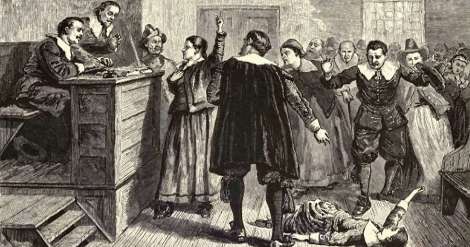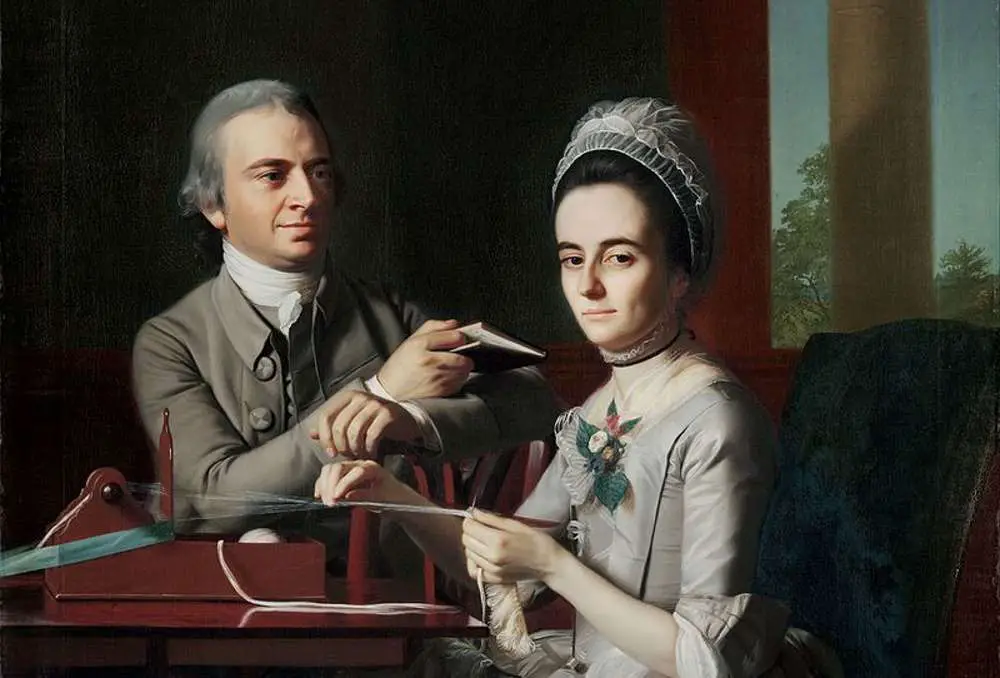The course of true love is never smooth, and in colonial New England young couples had many courtship customs to contend with.
Here are five that might seem foreign to today’s young people (or maybe not so different):
Engagements Were Difficult to Break
Divorces were hard (though not impossible) to get in early New England, but even breaking off an engagement could cause a legal row. In the earliest days of the Plymouth Colony men could and did sue their future fathers-in-law for withdrawing consent to marry their daughters. And men and women who were jilted (or shabbed as it was sometimes called), could sue for lost time spent in courting.

Failing to follow Puritan courtship customs could land you in court.
Kissing Was a Crime
The Puritans, of course, frowned upon public displays of affection. But even in the privacy of the home, young men and women weren’t supposed to kiss one another.
In a 1660 case in New Haven, Sarah Tuttle had to pay a fine for kissing Jacob Murline. Jacob seized one of Sarah’s gloves and playfully said he would return it if she gave him a kiss. Quite a kiss it was. The couple kept at it for a half an hour, to the shock of someone who spotted them and had them hauled to court. The result was a rebuke and a fine for Sarah.
Oafish Young Men, Even in 1680
Judge Samuel Sewall recorded the struggles of his daughter to find love with Sam Gerrish. Sam’s father had conspired with the judge to marry off the boy to the judge’s daughter, Mary. Sam, it seems, had feet of clay when it came to this particular romance. The judge noted how one difficult-to-arrange dinner between the couple went awry:
In the evening Sam Gerrish comes not; we expected him; Mary dress’d herself; it was a painfull disgracefull disapointment.
Still, Gerrish did go through with marrying Mary. However, she died shortly after the wedding and Sam could pursue his true love.
Courting Sticks
In the Connecticut River Valley, especially, colonial courtship customs kept two wooing lovers apart. The couple had to whisper sweet nothings into the ear of the desired one from a distance of six to eight feet.
They accomplished this feat with a device called a courting stick — a wooden tube with a cup at each end. One party held the cup to her mouth while the other placed his cup at his ear and listened. And in case the couple was inclined to abandon the device for closer contact, these courting sessions were generally held in a room packed with the couple’s family.
Personal Ads
One way around all the negotiating over an arranged marriage was to cast a wide net for potential partners. An early and very direct personal ad appeared in a Boston Evening Post of Feb 23, 1759. The author, “A.W.” addressed it to:
Any young Lady between the Age of Eighteen and twenty three of a Midling Stature; brown Hair, regular Features and a Lively Brisk Eye: Of Good Morals & not Tinctured with anything that may Sully so Distinguishable a Form possessed of 3 or 400£ entirely her own Disposal and where there will be no necessity of going Through the tiresome Talk of addressing Parents or Guardians for their consent.
Should that interest a young lady who met the qualifications, she could leave a line directed for A.W. at the British Coffee House in King Street. She should appoint a place for an interview, where she will find A.W., who ‘flatters himself he shall not be thought Disagreeable by any Lady answering the above description.’
He promised profound secrecy and concluded, ‘No Trifling Answers will be regarded.’
No word on how well that colonial courtship custom worked.
Thanks to Customs and Fashions of Old New England by Alice Morse Earle. This story about colonial courtship customs was updated in 2022.
